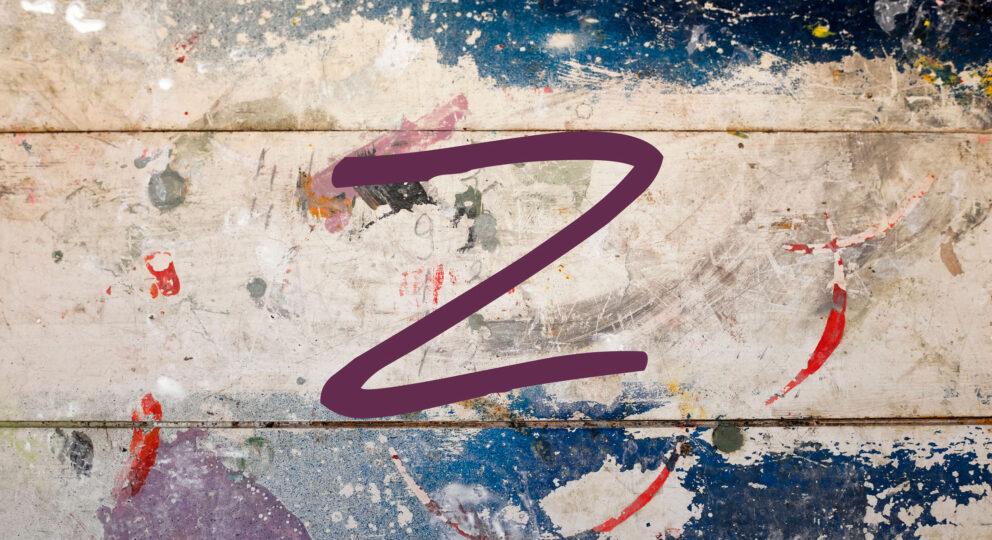Here we are at Zed – the end of the alphabet. It’s been a pretty incredible experience working through these 26 topics and exploring a little bit of what I tend to think about relationships. I imagine I’ll have some withdrawal symptoms now that it’s finishing up. I was tempted to write Z is for Zach, and tell you all about my ambivalence, but I’m not that much of a narcissist. Instead, I’ll turn my attention toward two of my favorite concepts in the Gottman lexicon. Lucky for me they both start with Z.
The first is the Zeigarnik Effect named for Bluma Zeigarnik, a Lithuanian psychologist who is credited with a specific insight regarding memory. As the story goes, she was observing waiters in a cafe and became curious about how they remembered customer orders. She noted that these waiters were able to remember even the most complicated orders in detail until the moment they submitted the order to the kitchen.
Her speculation, later confirmed, was that people remember uncompleted or interrupted tasks better than completed tasks. This notion has implications for both students and couch potatoes. The reason we tune in to Scandal week after week is not only because it’s a great show, but because our mind wants to close the loop on the latest cliffhanger. Students benefit from the Zeigarnik Effect by using a variety of learning strategies which aid memory better than cramming. Even procrastinators (like me) can benefit by simply starting an activity. The Zeigarnik Effect suggests that the brain will then continue noodling on the task until it is completed.
Dr. Gottman has applied the Ziegarnik Effect to relationships, noting that when arguments or disappointing events go unaddressed, the pain of that memory lives on “like a stone in one’s shoe.” It’s a constant, nagging reminder that can lead to negative sentiment toward the partner and the relationship. Ultimately the memory has more power than it deserves. Couples need to learn how to process these things together.
Dr. Gottman again: “Between lovers, arguments that end with confessions, amends, and deeper understanding of one another tend to be soon forgotten, although their legacy is a stronger, more enduring relationship.” Lately I’m less and less convinced that a negative memory can ever truly be erased, but it can be replaced by a stronger more positive experience of empathy and understanding. That’s where the magic is.
Unfortunately, most couples aren’t terribly skilled at this process. The truth is that most people aren’t terribly skilled at this process. We’re really good at stating our case, defending our position, and protecting our turf. If not that, then we’re also pretty good at avoiding conflict altogether – this is commonly referred to as “fight or flight.” It’s the way we’re wired. But this wiring doesn’t often serve our relationships. In fact, it often leads us into today’s second “Z” topic: the zero-sum game.
In game theory, the zero-sum game is the idea that in any interaction, one party’s gain is precisely balanced by another party’s loss. When I win, you lose. Obviously this doesn’t work in a relationship. In fact, I’m convinced that whenever one person wins at the expense of another – especially in a marriage – then both partners lose.
Couples need to break the zero-sum game pattern by emphasizing (once again) empathy and understanding. Partners must work ensure that the relationship wins. This means that even when you’re in disagreement, you’re still thinking about your partner’s best interests. This is a skill. Which means, you can learn it. Start by changing the way you think about the game. The zero-sum game is a finite game, designed to be won. Relationships are a different kind of game, designed to be prolonged and enjoyed. Read more on this in R is for Repair.
The good news is that you can combat the effects of the Zeigarnik Effect and the zero-sum game mentality. Neither of them are irreversible. But you must make process a priority. Process means dealing with the stones in your shoes through intimate conversation and attunement. It means getting to know your partner’s story and their perspective, almost better than your own. It means learning new skills. And believing in magic. Your relationship is worth the effort. You’re worth the effort.
ACKNOWLEDGEMENTS
I’d like to end this last Relationship Alphabet column by saying thank you. Thanks to The Gottman Institute for the opportunity to contribute and for being so generous and open-handed with your content. Thanks to Drs. John and Julie Gottman and the countless therapists, researchers, and even couples who make this content so accessible and compelling. Thanks to those of you who read, enjoyed, commented and/or shared any of these posts. You kept me on topic and on time throughout the series. I just hope that my words offered some measure of hope and healing to you and your relationships. As for me, I’ve grown as a therapist, husband, and person by exploring and mucking about in this incredible body of knowledge through the year. Special thanks to Joanna and Anne, my proof-readers and sense-makers. But the greatest measure of my gratitude belongs to my wife Rebecca who has been my primary sounding board, fact-checker, and bullshit-caller this year as well as a my biggest cheerleader and most reliable teammate in the infinite game we call our marriage.










